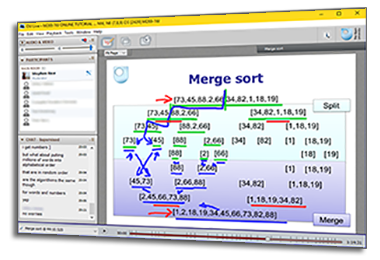
At Isotoma, our recruitment policy is forward-thinking and slightly unconventional. We prioritise how you think rather than where, or even if, you studied formally. This is not to say that we don’t have our fair share of academics, with a former Human Computer Interaction researcher in the team among many more similarly impressive backgrounds!
This nonconformist approach spans the whole of Isotoma; and some of our clients may have noticed that, as a rule, I “don’t do Mondays”. So where am I? What am I doing? Being one of those academic types… I work as an Associate Lecturer at the Open University.
What is the Open University?
Like perhaps many people of a certain age I mainly associated the Open University with old educational TV programmes. So I was surprised to discover that the OU is the largest university in the UK with around 175,000 students, which is 40% of all the part-time students in the country!
The O in OU manifests itself as flexibility. It provides materials and resources for home study, allowing three quarters of students to combine study with full – or part-time work. Admissions are also open, with a third of students having one A-Level or lower on entry.
Studying in that context can be exceptionally challenging. So for each module, students are assigned a tutor to guide, support and motivate them: to illustrate, explain and bring the material to life. This is where I come in.
Tutoring

A screenshot of a course planning application
Oddly enough, given my developer position at Isotoma, I teach second and third year computing modules! I initially tutored web technologies, then diversified into object-oriented software development; algorithms, data structures and computability; and data management, analysis and visualisation.
The role of a tutor has three major components. To me, the most important is acting as the first point of contact for my tutor group, providing support and guidance throughout the module. For OU students, study is only one of many things going on in their lives – in fact, a student once apologised to me for an incomplete assignment, because they had to drive their wife to hospital to give birth! As a tutor, it is crucial to understand this, as such a unique learning environment requires adapting your teaching approach to students’ varied lives.
Marking and giving feedback is a core part of the role, with busier weeks producing plenty of varied and interesting assignments. For every piece of coursework, I write a ‘feedforward’ for each individual highlighting the strengths shown, but also outlining suggestions and targets for improvement. Personal feedback on assignments is an excellent learning opportunity for students and can really improve their final result. I also encourage students to get in touch to discuss my comments, as not only can this lead to some enlightening debates, but helps them to be in control of their own learning.
The final component is tutorials. I conduct most of mine through web-conferencing, working in a team to facilitate a programme of around 40 hours per module. These web-tutorials are extremely useful as the group can interact, chat and ask questions from wherever they are, and we can explore complex concepts visually on a whiteboard or through desktop sharing.
Tutoring: impact on development?
There is a great synergy between the two roles: as developers we try to keep on top of our game and getting a regular range of student questions that may be about Python, JavaScript, PHP, SQL, Java or who knows what certainly keeps you on your toes! This can be good preparation for some of the more …interesting… projects that Isotoma takes on from time to time.
Having a group of students all trying to find the best way to implement some practical activities is also like having a group of researchers working for you. So once when a student used the :target pseudo selector to implement a CSS lightbox without JavaScript I quite excitedly shared this technique in our development chat channel! Though (of course) our UX team were already well aware of it… but it was news to me!
To explain concepts you really need to understand them, and sometimes you realise over time what you thought you knew has become a bit shallow. Preparing a tutorial on recursion and search algorithms was a great warmup for solving how HAPPI implements drag and drop of multiple servers between racks – where not everything you drop may be able to move to the new slot, or the slot may be occupied by another server you are dragging away.
There isn’t an exact correlation between what I tutor and what I develop. Some topics push you beyond your comfort zone, so the implications of the Church-Turing thesis or the pros and cons of data mining are not things that crop up much in daily work, but things I’ve learnt in tutoring on data visualisation have proved to be pretty handy.
And of course some projects, such as the Sofia curriculum mapper for Imperial College of Medicine, are educational so domain knowledge of university processes is of direct relevance in understanding client requirements.
Development: impact on tutoring?
One of the reasons the OU employs part-time tutors is for the experience they bring from their work. In that respect, I can provide examples and context from what we do at Isotoma. This serves to bridge the gap between (what can sometimes be) quite dry theory and the decisions/compromises that are part and parcel of solution development in the real world.
So if a student questions the need to understand computational complexity for writing web applications, we can discuss what happens when part of your app is O(n²) when it could be O(n) or O(log n). Or the difference between a site that works well when one developer uses it and one that works well with thousands of users – but also discuss the evils of premature optimisation!
Being part of a wider team at Isotoma also allows me to talk about approaches to issues like project management, security, testing and quality assurance. Recently I’ve also started feeding some of Francois’ (Isotoma's Director of User Experience) tweets into discussions on usability and accessibility, which is fun.
Web development is a fast-moving field so while principles evolve gradually, tools, frameworks, languages and practices come and go. Working in that field allows me to share how my work has changed over time and what remains true.
If you work in the IT industry and are looking for a different challenge then I would highly recommend becoming an OU computing tutor. Tutoring one group doesn’t need a day a week every week and it’s great to know that you’re sharing that expertise to those for whom full-time study isn’t an option, and developing a new generation of colleagues.

